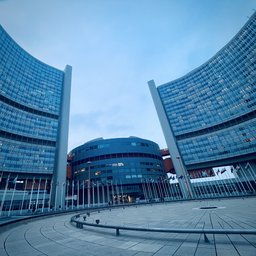Heading into this year’s Internet Governance Forum, the issue of Internet fragmentation is again high on the agenda.
For the past two decades, there have been books written, reports drafted, conferences sessions and webinars convened on the topic. Last year even the UN Secretary-General identified ”avoiding Internet fragmentation” as a priority for the planned Global Digital Compact. So while we’ve all been down this path before, concern about “fragmentation” is, in an important sense, driving the strategies and approaches of many policymakers, especially in the public sector.
Typically, such conversations begin with an open question: “What do we mean by Internet fragmentation?” If we’re being blunt, many conversations don’t really make it past that question. And it’s worth considering why this concept is so difficult to pin down.
In a sense, “fragmentation” is the antithesis of everything that we want and expect the Internet to be. The fact that we talk about the Internet, rather than an Internet suggests that we see the Internet as singular, the point of unification for a myriad of networks, services and applications. The Internet is the solution to a fragmented network of networks. So fragmentation of that Internet would indeed be problematic.
While we can generally find agreement on this broad concept, that poses a further problem. As the antithesis of what we want and expect the Internet to be, “fragmentation” gets loaded with whatever your favourite threat, concern or fear for the Internet might be, whether that is government intervention, Big Tech business dynamics or changes in standardisation practices. This means that any discussion of Internet fragmentation, especially a discussion of how to avoid fragmentation, is hamstrung from the outset by the fact that discussants must first agree on exactly what is to be avoided. To co-opt a concept from Buffy the Vampire Slayer, fragmentation is the Internet’s original Big Bad.
Scoping the Fragmentation Discussion
If we want to find our way to practical strategies and measures to avoid fragmentation, we need to scope the problem a bit more clearly. And many have made various attempts at this over the past two decades. One notable example came via a paper published in 2016, commissioned by the World Economic Forum, and authored by William Drake, Wolfgang Kleinwächter and Vint Cerf. Here, fragmentation was considered in three distinct categories:
- Technical Fragmentation
- Governmental Fragmentation
- Commercial Fragmentation
More recently, the Internet Governance Forum has established a Policy Network on Internet Fragmentation (PN-IF), which has similarly tried to develop a framework that captures a range of fragmentation concerns, albeit with some slightly different focus points:
- Fragmentation as it relates to user experience
- Fragmentation at the technical layer
- Fragmentation at the governance/coordination layer
These efforts, and many others, have helped illustrate and draw attention to a range of threats, whether to the Internet itself or to the rights and expectations of those who use the Internet. They have ensured that fragmentation (and the importance of fostering and maintaining a single, interoperable global Internet) has remained a focal point for governance discussions. But I’m not sure we’ve nailed down the practical implications of that principle for all stakeholders.
Some Personal Thoughts on Internet Fragmentation
To discuss Internet fragmentation is truly to stand on the shoulders of giants, and it can be a daunting conversation to step into. But having contributed to some recent events, this blog seems a good place to record some of my personal thoughts and reflections on the issue.
There are many ways in which an Internet user might experience something akin to “fragmentation” of the global Internet - they may be prevented from accessing certain sites or networks that they believe should be accessible because of blocks put in place by governments or companies. In the extreme, they may find their government cutting them off from access to any parts of the Internet.
These are serious issues, presenting significant challenges in terms of human rights, data governance, privacy, and access - many of the other themes identified by the Secretary-General as essential to a Global Digital Compact. And venues like the IGF have identified these as distinct work tracks. That being the case, it makes sense to prioritise those aspects of fragmentation that don’t fall easily into these other areas - what are the threats not being discussed when we talk about human rights, data governance, privacy or access?
Going back to the principle laid out above - that fragmentation is the antithesis of a global Internet - I see two major ways in which fragmentation is a current and real threat to the global Internet.
First: a global network of networks relies on certain fundamentals - standards, protocols, common architectural elements. In essence, this comes down to agreements regarding those fundamentals:
- Agreement on the definitive record of who holds which IP address;
- Agreement on the authoritative DNS root zone file;
- Agreement that organisations such as the RIPE NCC or ICANN have the authority to administer Internet number or name resources;
- Agreement that these organisations will be governed according to multistakeholder processes.
There is a very real threat of fragmentation of the agreement on these fundamentals. The governance models and principles upon which such agreements were predicated were conceived in a different era, and the governance modes and processes were not developed (or stress-tested) against the kind of conflict and distrust that we see today. Not only has the Internet evolved (both in its technology and its place in society); so too has the challenge of achieving the consensus necessary to maintain a global Internet.
The other example that I’ve talked about a lot recently is economic sanctions and their application to core Internet functions, such as the IP address registration. In placing the administration of these global functions in the hands of non-state organisations (like the RIPE NCC), there has been a tacit assumption that the domestic politics of the countries where those organisations were based would not affect their ability to carry out their function. Sanctions, as a political tool, undermine that assumption, and the broader trust relating to multistakeholder Internet governance. With that loss of that trust, you find governments wondering whether their citizens’ ability to use the Internet will be dictated by the political winds in a foreign state, and looking for alternatives that might give them more control and more autonomy… but potentially at the cost of a global Internet.
A Fragmenting Discourse
The second threat is reflected in the work of the PN-IF: fragmentation of governance and coordination. The Internet has become so all-encompassing and intertwined with so many other fields, that there is a real danger of fragmenting any attempt to govern the Internet in a globally coordinated way - there are simply too many standardisation bodies, legislatures, industry groups, intergovernmental organisations making laws, standards, best practices. Effective coordination simply may not be achievable.
In a sense, this is what the IGF was established to prevent - a crucible for all those with a stake to come and have a diverse range of discussions, to learn from each other, to understand the full range of governance issues and - importantly - what governance efforts are being made to actually address those issues. In short, a key to the interoperability of Internet governance.
I believe that it’s had some important successes in that, but the challenge remains (in fact, is probably more of a challenge than ever before) and the jury is out on whether it will be possible to prevent or mitigate the kind of fragmentation that we see in Internet governance.
A Valuable Common Resource
Vint Cerf recently noted (in the closing of the CITI webinar, “Internet Fragmentation, Reconsidered”) that there are two priorities in Internet governance: to maintain the value provided by the global Internet, and to protect its users. A great deal of effort is rightly being invested in protecting the Internet’s users, but we best serve those users if we can also maintain a global Internet and all the extraordinary value that goes along with it. To do that, we will need to find ways to work cooperatively, and to maintain (and in some cases, build back) the trust that is essential to the Internet as we know it.





Comments 2
The comments section is closed for articles published more than a year ago. If you'd like to inform us of any issues, please contact us.
Stéphane Bortzmeyer •
"Agreement that organisations such as the RIPE NCC or ICANN have the authority to administer Internet number or name resources" Organisations like the RIPE-NCC are a mean, not a goal in itself. If RIPE-NCC or ICANN were to be replaced by something else, it does not mean that the Internet would become fragmented. This mention of organisations appears a little bit too self-serving. "Agreement that these organisations will be governed according to multistakeholder processes" Again, this has nothing to do with fragmentation. If all the Internet were directed by Elon Musk according to a onestakeholder process, it does not mean it would be fragmented. Not every bad outcome is "fragmentation".
Chris Buckridge •
You have a point, Stéphane, (and it was perhaps a little self serving), but if no consensus can be achieved around a different set of organizations or approach to governance, then I’d argue that fragmentation is indeed a possibility. And in the current climate, I think achieving a new consensus would be a challenge.